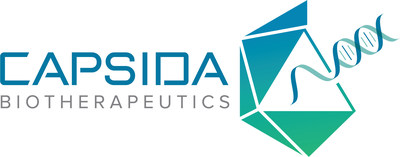GCase elevations meaningfully exceeding efficacy threshold, well-tolerated safety profile, and IV-administration support advancing CAP-003 into clinical development in 1H25.
THOUSAND OAKS, Calif., April 3, 2025 /PRNewswire/ -- Capsida Biotherapeutics ("Capsida") today announced new data from the three-month cohort of a GLP toxicology study in non-human primates (NHPs) with CAP-003, its intravenously (IV) delivered gene therapy for Parkinson's disease associated with GBA mutations (PD-GBA). CAP-003, enabled by one of Capsida's proprietary engineered capsids and cargo, demonstrates best-in-class potential to effectively and safely treat PD-GBA. These data will be presented in oral presentations at the International Conference on Alzheimer's and Parkinson's Diseases (AD/PD) being held April 1-5, 2025, in Vienna, Austria, and the American Academy of Neurology (AAN) annual meeting taking place April 5-9, 2025, in San Diego, CA. Capsida is on track to file an Investigational New Drug (IND) application in the second quarter of 2025.
Mutations in GBA, the gene expressing the GCase enzyme, affect up to 15% of PD patients and are the most common genetic risk factor for PD. Post-mortem studies demonstrate an approximate 30% GCase activity deficit in patients compared to healthy individuals1. There are no approved treatments that target GCase and there are no disease modifying treatments for PD. Other investigational treatments for PD-GBA have been limited by their lack of specificity and inability to cross the blood-brain barrier and supplement GCase enzyme activity in sufficient quantities to overcome the deficit in patients and impact the disease. In an attempt to overcome these challenges, those treatments have required invasive direct brain or cerebrospinal fluid (CSF) administration, with limited results, but significant burden for patients.
In the study, CAP-003 was delivered via IV infusion at doses of 9.8E12, 3.1E13, or 5E13 vg/kg. Three months after a single administration, results demonstrated dose-dependent increases in GCase activity in critical brain regions including the substantia nigra, frontal cortex, caudate nucleus, and putamen substantially above the established 30% efficacy threshold expected to restore enzyme activity levels back to normal in patients with PD-GBA. A single IV infusion of CAP-003 resulted in an increase in average brain GCase activity by up to 206% and an increase in average brain GCase bulk protein by up to 415% in relevant brain regions compared to healthy, untreated animals. Strong correlation between GCase protein in the CSF and GCase activity in the brain supports use of GCase levels in CSF as a potential clinical biomarker. Furthermore, decrease in levels of the GCase substrate glucosylsphingosine in the plasma confirm target engagement by CAP-003 in healthy NHPs and also demonstrates its utility as a clinical biomarker. Results from this study showed CAP-003 was well tolerated with no adverse clinical observations or adverse histopathology findings.
"We're excited by the emerging data from our GLP toxicology study demonstrating the potential of CAP-003 as a best-in-class treatment for PD-GBA," said Peter Anastasiou, Capsida's Chief Executive Officer. "Capsida is on track to file an IND for CAP-003 in the second quarter of this year, with the goal of bringing a much-needed disease-modifying treatment option to those suffering from this debilitating disease."
Presentation Details
AD/PD:
- Title: Systemic AAV Gene Therapy with CNS-Targeted Engineered Capsids Significantly Increases GCase Activity to Support the Potential Treatment of PD-GBA
- Date and Time: Saturday, April 5, 2025; 12:40-12:55 PM CET
- Session: AD & PD: Towards Novel Therapeutic Intervention
- Location: Austria Center, Vienna, Hall F1
- Presenter: Kimberly McDowell, Ph.D., Director of Preclinical Research, Capsida
AAN:
- Title: Systemic AAV Gene Therapy Using a CNS-targeted Engineered Capsid Significantly Increases GCase Activity to Support the Potential Treatment of PD-GBA
- Date and Time: Wednesday, April 9, 2025; 2:12-2:24 PM PT
- Session: S37: Movement Disorders: Clinical Trials
- Location: San Diego Convention Center | 4
- Presenter: Reed Ressler, Ph.D., Senior Scientist, Capsida
About Capsida Biotherapeutics
Capsida Biotherapeutics is a fully integrated next-generation genetic medicines company with a central nervous system (CNS) pipeline consisting of disease modifying and potentially curative treatments for rare and more common diseases across all ages. Capsida's wholly owned pipeline includes a potential first-in-class treatment for STXBP1 developmental and epileptic encephalopathy (STXBP1-DEE), best-in-class treatment for Parkinson's disease associated with GBA mutations (PD-GBA), and best-in-class therapy for Friedreich's ataxia (FA). The STXBP1-DEE and PD-GBA programs are on track to enter the clinic in 1H 2025. In addition to its wholly owned programs, the Company has validating partnerships with AbbVie, Lilly, and CRISPR Therapeutics. Capsida was founded in 2019 by lead investors Versant Ventures and Westlake Village BioPartners and originated from groundbreaking research in the laboratory of Viviana Gradinaru, Ph.D., a neuroscience professor at Caltech. Visit us at www.capsida.com.
1Leyns, C. E, G. et al (2023). npj Parkinson's Disease, 74(9).
![]() View original content to download multimedia:https://www.prnewswire.com/news-releases/capsida-presents-new-data-from-glp-toxicology-study-in-nhps-demonstrating-potential-best-in-class-profile-of-cap-003-in-patients-with-parkinsons-disease-associated-with-gba-mutations-pd-gba-302417461.html
View original content to download multimedia:https://www.prnewswire.com/news-releases/capsida-presents-new-data-from-glp-toxicology-study-in-nhps-demonstrating-potential-best-in-class-profile-of-cap-003-in-patients-with-parkinsons-disease-associated-with-gba-mutations-pd-gba-302417461.html
SOURCE Capsida Biotherapeutics






